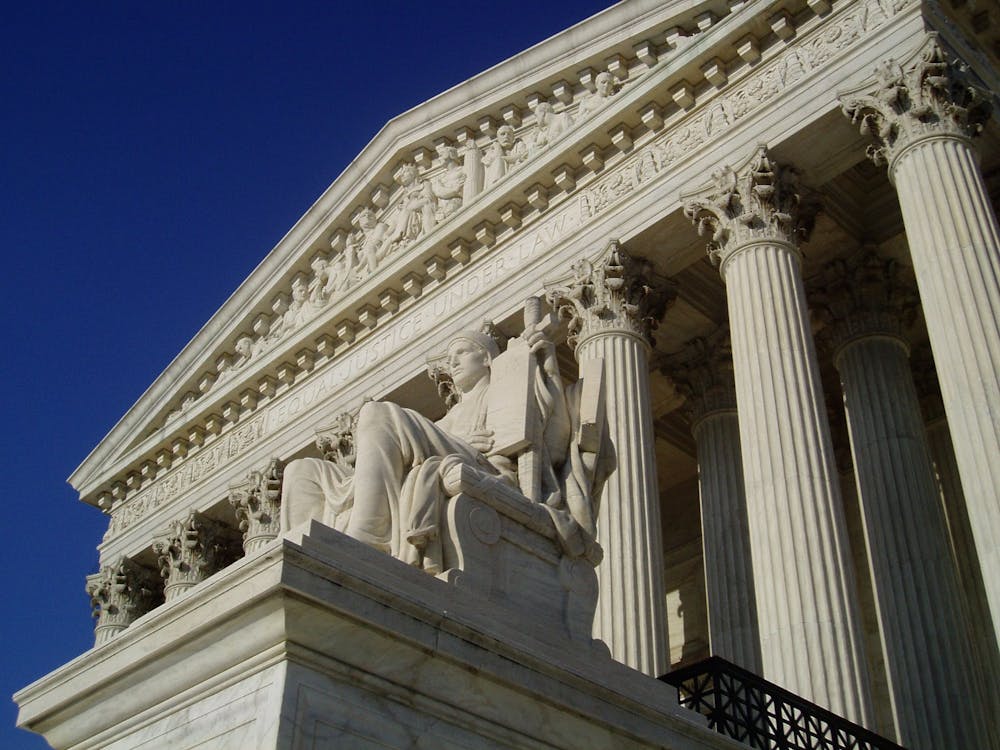The Supreme Court ruled against President Joseph Biden’s student debt forgiveness plan in a 6-3 decision.
Among undergraduate students at Duke, 30% take out loans to graduate. Duke students graduate with a median debt of $13,500, which is below the national average, wrote Miranda McCall, assistant vice provost and director of the Karsh Office of Undergraduate Financial Support, in an email to The Chronicle in March.
Biden’s latest extension suspending student loan payments is set to expire on Aug. 30, which is 60 days after the decision’s release. In signing legislation to lift the debt ceiling in early June, further suspensions of student loan payments have been eliminated.
In the majority opinion, authored by Chief Justice John Roberts, the Court ruled that the Higher Education Relief Opportunities for Students Act of 2003 does not authorize Secretary of Education Miguel Cardona to implement the debt forgiveness plan.
The Biden administration argued the HEROES Act gave it standing to alter loan payment plans or forgive portions of loans under the Education Act, in response to a national emergency.
But the Court said that Biden’s plan went too far.
“The authority to ‘modify’ statutes and regulations allows the Secretary to make modest adjustments and additions to existing provisions, not transform them,” Roberts wrote.
“The Secretary’s new ‘modifications’ of these provisions were not ‘moderate’ or ‘minor.’ Instead, they created a novel and fundamentally different loan forgiveness program,” he added.
In August 2022, Biden announced a plan forgiving up to $10,000 in student debt for those who did not attend college on a Pell Grant and $20,000 for those who were Pell Grant recipients. Only individuals earning less than $125,000 a year or married couples or households earning less than $250,000 a year were eligible for the plan. The White House announced that over 40 million borrowers were eligible for debt relief under the plan.
“We hold today that the Act allows the Secretary to ‘waive or modify’ existing statutory or regulatory provisions applicable to financial assistance programs under the Education Act, not to rewrite that statute from the ground up,” Roberts wrote in the decision.
The Court further held that the application of the HEROES Act would allow the Secretary to “enjoy virtually unlimited power to rewrite the Education Act.”
Quoting West Virginia v. Environmental Protection Agency, a case in which the Court ruled that the Environmental Protection Agency failed to point to “clear congressional authorization” to regulate greenhouse gasses, the Court held that the interpretation of the HEROES Act has “‘conveniently enabled [Cardona] to enact a program’ that Congress has chosen not to enact itself.”
Roberts concluded with a reference to “a disturbing feature of some recent opinions to criticize the decisions with which they disagree as going beyond the proper role of the judiciary.” He defends the decision as employing the “traditional tools of judicial decisionmaking.”
“We do not mistake this plainly heartfelt disagreement for disparagement. It is important that the public not be misled either. Any such misperception would be harmful to this institution and our country,” Roberts wrote.
In December, the Supreme Court agreed to hear arguments challenging Biden’s student loan relief program in Biden v. Nebraska, led by Nebraska, Missouri, Arkansas, Kansas, Iowa and South Carolina. The Republican-led states alleged that the Department of Education is not authorized to cancel loans.
The Court ruled that at least Missouri had standing to bring the case, because Biden’s plan would cost the Higher Education Loan Authority of the State of Missouri (MOHELA) $44 million per year. MOHELA is a “nonprofit government corporation created by Missouri to participate in the student loan market.”
In a separate case, Department of Education v. Brown, respondents Myra Brown and Alexander Taylor argued that the Biden administration failed to follow proper procedures under the Administrative Procedures Act in creating the plan. The respondents alleged that if the Biden administration followed proper procedures, they would have been able to weigh in on the plan and encourage changes to it that would have been more beneficial to them.
The Court unanimously ruled that the respondents lacked standing to bring the case to lower courts.
This is a developing story and will be updated as more information becomes available.
Get The Chronicle straight to your inbox
Sign up for our weekly newsletter. Cancel at any time.

Adway S. Wadekar is a Trinity junior and former news editor of The Chronicle's 119th volume.

Audrey Wang is a Trinity senior and data editor of The Chronicle's 120th volume. She was previously editor-in-chief for Volume 119.

